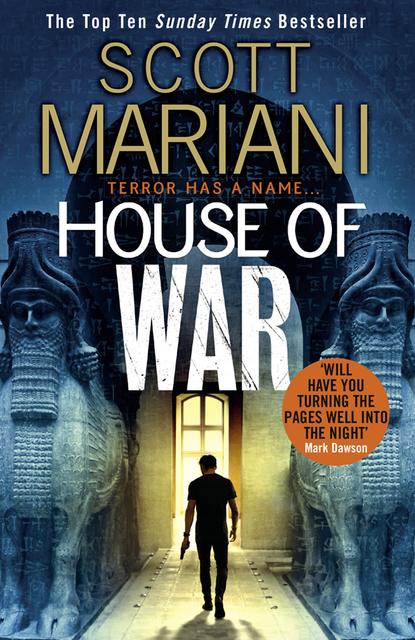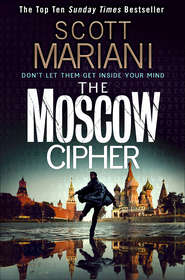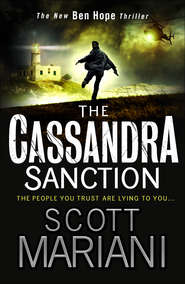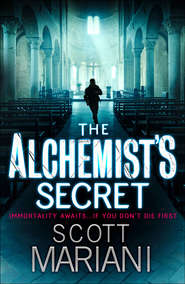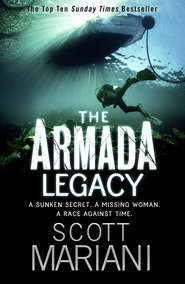По всем вопросам обращайтесь на: info@litportal.ru
(©) 2003-2024.
✖
House of War
Настройки чтения
Размер шрифта
Высота строк
Поля
‘So be it,’ the commander said. ‘What you ask for, you will receive.’ He nodded to his men. Four of them stepped forwards, seized Salim and Julien Segal each by the arms, and forced them down to their knees on the flagstone floor. The Frenchman knelt with his head bowed and shoulders sagging. Next to him, the older man refused to break eye contact with his tormentors and remained straight-backed, chin high.
The commander reached down to the hilt of the long, curved knife that hung from his belt, and drew out the blade with a sigh of steel against leather. Salim wouldn’t take his eyes off him for an instant, even though he knew what was coming.
Julien Segal let out a whimper. ‘For God’s sake, Salim. We have to tell them. Please.’
‘I’m sorry, Julien. I will not go to my grave knowing that I betrayed my life’s work to these maniacs.’
The commander stepped around behind Salim.
Salim closed his eyes.
What happened next had Julien Segal burying his face in the dirt and crying in unbearable anguish. But the old man never made a sound. He faced his death with the same steely resolve that he’d shown throughout his life.
Moments later, Julien Segal felt the thump of something hitting the floor beside him. Followed by a second, heavier thud as Salim’s decapitated body slumped forward to fall on the floor next to where the commander had tossed his severed head. Segal couldn’t bring himself to look directly at it, and instead watched in horror as the blood pool spread over the floor, trickling into the cracks between the flagstones and reflecting the light from the arched window.
‘Now it’s your turn,’ said the man called Nazim al-Kassar.
Chapter 1 (#uf400a57b-b30e-5b48-a121-0fcbff9e90b9)
The present day
It was a cold, bright and sunny October morning in Paris, and Ben Hope was making a brief stop-off in the city on his return from a long journey. The trip to India hadn’t been a scheduled event, but then few things in his life were, or ever had been, despite his best efforts to lead the kind of peaceful and stable existence he might have wished for. It seemed that fate always had other plans for him.
All he really wanted to do now was put the experience behind him, move on from it and get home. Home being a sleepy corner of rural Normandy some three hundred kilometres west of Paris, a place called Le Val, and he couldn’t wait to get there. First he had some business to attend to in the city, which he intended to get sorted as quickly as possible, partly since it was a rather dull chore that he’d put off for too long.
The first thing he’d done when his plane had landed at Orly Airport the previous evening was to call Jeff Dekker, his business partner at Le Val, to say he was back in the country and would be home by early next afternoon. Jeff was pretty well used to Ben’s frequent impromptu disappearances; all he said was ‘See you later.’
Ben’s second action was to call a Parisian estate agent he knew to talk about finally selling the backstreet apartment he’d owned for years and never used any more. Back when he’d worked freelance and lived a nomadic existence, the place had come in handy as an occasional base camp in the city. It had never been more than a bolthole for him, and he’d made little effort to furnish or decorate it beyond the absolute basics of necessity. The pragmatic nature of military life was an ingrained habit that refused to die in him, though he’d been out of that world for quite some years.
Whatever the case, the apartment had long since become surplus to his requirements. Though every time he’d been on the verge of putting the place up for sale, as had happened on several occasions, another of those bolts from the blue would arrive to yank him off on some new crazy mission or other. Which, as he was all too aware, was just a reflection of the broader reality that whatever kinds of plans he had in mind, some new crisis would invariably loom up to divert him right off track.
Such was life. Maybe, after another forty years, he’d get used to it.
But that wasn’t going to happen this time, he told himself. This time he was going to bite the bullet, put the place on the market, go home to Le Val and get back down to running his business. The eternally patient Jeff, his longtime friend and co-director of the tactical training centre they’d founded and built together, might appreciate Ben’s actually being around sometimes. Instructing the world’s top law enforcement, security and close protection services in the finer points of their craft was a dirty job, but someone had to do it.
It was just after eight a.m. At ten-thirty he was due to meet with the property agent, a nervous-mannered chap called Gerbier who, Ben already knew, would spend an hour hemming and hawing about the difficulties of selling the place. First, because despite its theoretically desirable central location it was all but totally secreted away among a cluster of crumbly old buildings and its only access was via an underground car park. Second, because even at its best it had never looked like much on the inside, either, and needed decoration work to appeal to any but the most Spartan of buyers. And third, because right now wasn’t a good time for the Parisian property market in general.
Ben had to admit the guy might have a point about that. For months the city had been locked in increasingly turbulent civil unrest, boiling with constant anti-government protests that had sparked off over a long list of political and social grievances and seemed to grow more serious and violent each passing day. There had been mass arrests, the cops had started deploying armoured personnel carriers and water cannon in the streets, and there were no signs of things cooling down any time soon. Now the troubles had spread across the city into Ben’s normally quiet neighbourhood. He had lain awake for some time last night, listening to the screeching sirens and loud explosions of the latest pitched battle between rioters and the police. It had sounded like both sides meant business.
‘Who can tell where this will end?’ Gerbier had fretted over the phone. ‘The city’s falling into anarchy. Nobody’s buying any more.’
How justified was Gerbier’s pessimism, only time would tell. Ben had been up with the dawn that morning, as always. He’d laboured through his usual gruelling pre-breakfast workout of press-ups, sit-ups and pull-ups, taken a one-minute tepid shower, pulled on fresh black jeans and a denim shirt, scanned a few latest news headlines online, meditatively smoked a couple of Gauloise cigarettes while gazing out at the non-existent view for what might be one of the last times if he got lucky finding a buyer soon, then turned his thoughts to eating breakfast. Dinner last night had been a sandwich wolfed down on the hoof at the airport, and he was starving.
That was when Ben had realised that there wasn’t a scrap of food in the apartment. Worse, much worse, the bare kitchenette cupboards contained not a single coffee bean.
And so here he was, heading briskly along the street, his scuffed brown leather jacket zipped against the chill and the third Gauloise of the day dangling from his lip, in the direction of a local coffee bar where he could get some breakfast and a much-needed fix of the black stuff. It was a five-minute stroll, but when he got there he discovered to his chagrin that the coffee bar had had its windows smashed in last night’s disturbances and was shut.
The owners weren’t the only local traders to have suffered damage from the latest round of protests. All up and down the street, storekeepers were resignedly sweeping up broken glass, nailing plywood sheets over their shattered windows, hauling out buckets of hot soapy water to try and scrub away graffiti that had appeared overnight. Ben stopped for a brief conversation with Habib, who ran the little Moroccan grocery store and tobacconist’s where he’d often bought his cigarettes. Habib expressed sympathy with the protesters but worried that his insurance premiums would sky-rocket if these riots kept up. Ben offered his commiserations, wished Habib good luck and walked on in search of breakfast. He still had plenty of time to kill before meeting Gerbier.
The signs of last night’s troubles were all around. Though it hadn’t rained overnight the roads and pavements were slicked wet, small rivers created by police water cannon trickling in the gutters and pooling around washed-up garbage that choked the drain grids. A recovery crew with a flatbed lorry were removing the burnt-out shells of three cars that had been torched by the protesters. Barriers and cones had reduced the traffic to a crawl as cars and vans and motorcycles threaded their way along streets still littered with riot debris and spent tear gas canisters.
As Ben walked along, he spied one rolling in the gutter and picked it up to examine it, just out of curiosity. It was the strong stuff, the real McCoy. Then again, France’s riot police never had mucked about when it came to dispersing violent demonstrations. The warning on the empty canister said, in French: DANGER – DO NOT FIRE DIRECTLY AT PERSON(S) AS SEVERE INJURY OR DEATH MAY RESULT. Ben had seen from the online news headlines that a couple of civilians had already been accidentally killed that way as the protests mounted. There was a good chance of more fatalities to come. One serious casualty among the police, and the government would probably send in the army.
Ben continued on his way, thinking about Gerbier’s words and wondering where, indeed, it was all going to end. As he’d grown older and wiser he had come to understand that history was the key to predicting what lay in the future. As the saying went, those who failed to learn from the hard lessons of the past were doomed to repeat them. Paris had seen more than its fair share of revolutionary unrest in its time, and none of it seemed to have done much good. The big one of 1789 had kicked off much the same way as was happening now – and look how that ended, eating itself in an orgy of blood and severed heads and giving rise to the Napoleonic empire and rather a lot of even bloodier wars, followed eventually by a new monarchy to take the place of the old. Then had come the July Revolution of 1830, the one portrayed in the famous Delacroix painting that used to be on the old 100-franc banknote, depicting the topless Liberty wielding tricolour flag and musket as she led the people to victory, this time against the royal regime of Charles X. Same dubious result. Then just eighteen years later they’d been at it again, with the populist uprising of 1848 that had spilled enough blood in the streets of Paris to tear down the establishment once more and trigger the foundation of the Second Republic, which lasted exactly three years before the Second Empire turned the country back into a de facto monarchy.
And on, and on, through the ages and right up to the present. Round and round we go, Ben thought. An endless cycle of inflamed passion leading to disappointment, and resentment, and blame, simmering away and slowly building up to the next outburst. And for what? So much suffering and destruction could only deepen the rift between nation and state, while calls for reform would largely go unheeded and life would ultimately carry on just like before. Sure, go ahead and protest about overinflated taxes and rising costs of living and the insidious encroachment of the European superstate and police brutality and human rights infringements and loss of personal freedoms and privacy and anything else you feel strongly about. All fine. Angry mobs ripping their own beautiful city apart, looting and pillaging, harming small businesses, traumatising innocent citizens, not so fine. Unless you really believed that a violent street revolution was the only possible way to change things for the better.
Well, good luck with that.
Those were all the things on Ben’s mind as he walked quickly around the corner of Rue Georges Brassens and collided with a young woman who, quite literally, ran into him without looking where she was going.
He didn’t know it yet, but fate had just launched another of those bolts from the blue at him.
Chapter 2 (#uf400a57b-b30e-5b48-a121-0fcbff9e90b9)
The woman crashed straight into Ben with enough force to knock the wind out of herself and send her tumbling to the pavement. It took Ben a moment to recover from his own surprise.
Though it hadn’t been his fault, he said in French, ‘Oh, I’m so sorry,’ and went to help her to her feet. He’d become skilled at languages back during his time with Special Forces, learning Arabic, Dari, Farsi and some African dialects, along with various European languages. He had now been living in France long enough to virtually pass for a native speaker.
As she picked herself off the pavement he saw she was more stunned than hurt. She was maybe twenty-five years old and slender, wearing a long camel coat over a white cashmere roll-neck top and navy trousers. Her hair was sandy-blond and her face, if it hadn’t been flushed with shock, was attractively heart-shaped with vivid eyes the same blue as Ben’s own. She didn’t look as though she weighed very much, but it had been quite a collision. The little leather satchel she’d been carrying on a shoulder strap had fallen to the pavement and burst open, scattering its contents.
‘Are you okay?’ Ben asked her. She seemed too flustered to reply, and kept looking anxiously behind her as though she expected to see someone there. A couple of passersby had paused to gawk, but quickly lost interest and walked on. Ben said, ‘Miss? Are you all right?’
The woman looked at him as though noticing him for the first time. Her blue eyes widened with alarm. She backed away a couple of steps, plainly frightened of him. He held his arms to the sides and showed her his open palms. ‘I mean no harm,’ he said jokingly. ‘You’re the one who ran into me. Maybe you should look where you’re going. Here, let me help you with your things.’
He crouched down to pick up her fallen satchel. Her purse had fallen out, along with a hairbrush, some hair ties, a book of Métro tickets and a little black plastic case that said GIVENCHY in gold lettering. The contents of women’s handbags had always been a bit of a mystery to Ben. He was also aware of the delicacy of the situation as he quickly scooped up her personal items from the pavement. She paid no attention while he retrieved her things, apparently too distracted by whatever, or whoever, she seemed to think was lurking in the background. When Ben stood up and offered the satchel back to her, she reached out tentatively and snatched it from his hands like a nervous animal accepting a titbit from a strange and untrusted human.
So much for being a knight in shining armour.
‘You’re bleeding,’ he said, noticing that she’d scuffed the side of her left hand in the fall. ‘Doesn’t look too bad, but you should put some antiseptic on it.’
Still the same terse silence. She turned her anxious gaze behind her again, scanning the street as though she thought she was being followed. Pedestrians walked by, paying no attention. The traffic stream kept rumbling past in the background. A municipal cleaning crew was slowly working its way along the street towards them, gathering up last night’s wreckage. A couple of pigeons strutted and pecked about among the debris in the gutter, seemingly unbothered by whatever was frightening the woman. Then she quickly looped the strap of her satchel over her shoulder and hurried on without a word or another glance at him.
Ben watched her disappear off down Rue Georges Brassens, walking so fast she was almost running, still glancing behind her every few steps as if someone was chasing her.
He shook his head. Some people. What the hell was up with her? The way she’d acted with him, anyone would think he’d been about to attack her. And who did she think was coming after her?
Maybe she was an escaped lunatic. Or a bank robber fleeing from the scene of the crime. Perhaps some kind of political activist or protest organiser the cops were trying to round up and throw in jail along with the other thousand-odd they’d already locked up.
Ben looked around him and saw no squads of gendarmes or psychiatric ward nurses tearing down the street in pursuit. Nor anyone else of interest, apart from the usual passersby who were all just going about their business, the majority of them deeply absorbed in their phones as most people seemed to be nowadays, doing the thumb-twiddling texting thing as they ambled along and somehow managed to avoid stumbling into trees and signposts. It seemed to him that those without digital devices to distract them from their present reality were walking somewhat more briskly than normal, a little stiff in their body language as if trying hard not to take in too much of their surroundings and dwell at any length on the signs of the battlefield that their city environment had become.
One way or another, though, the Parisians had far too much on their minds to be worrying about some panic-stricken woman running down the street blindly crashing into people.
Ben shrugged his shoulders and was about to move on when he saw that the young woman had dropped something else on the ground. She’d been so distracted that she had failed to notice that her phone had bounced off the kerbside and into the gutter, where it was lying among the washed-up debris and broken bottles the cleaning crew hadn’t yet reached.
He picked it up. A slim, new-model smartphone in a smart black leather wallet case. The leather was wet, but the phone inside was dry. There was no question that it hadn’t been lying in the gutter for long, and that it belonged to the woman. He could feel the residual trace of warmth from where it had been nestling in her bag close to her body. In an age when people’s phones seemed to have become the hub of their entire lives, she must have been in a hell of a preoccupied state of mind not to have noticed its absence.
Ben stood there for a moment, thinking what he should do. Further along the street he could see the striped red and white awning of a café-bistro that had obviously escaped damage and was open for business. His mouth watered at the thought of coffee and croissants and he was torn between the temptation of breakfast and the notion of going after the woman to return her phone. She was well out of sight by now, and could have turned off onto any number of side streets. He decided on breakfast and slipped the phone into his pocket.





